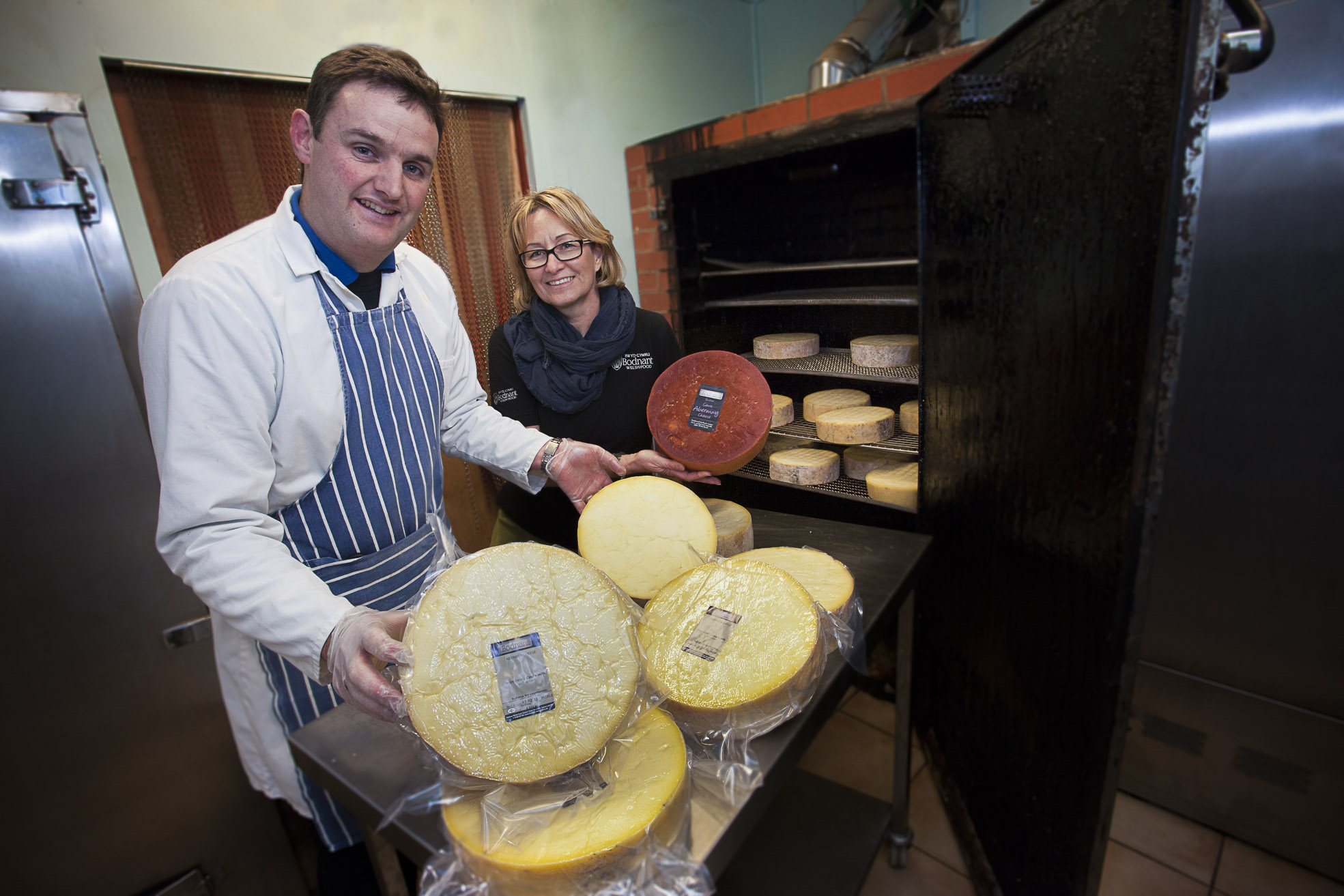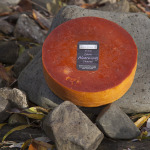A Welsh centre of food excellence is rolling out a new smoked variety of its award-winning cheese.
Abermwg from Bodnant Welsh Food Centre is cold-smoked over oak and beech wood chips at a Chirk company that supplies food for the Orient Express.
The new hand-tended cows-milk artisan cheese has proved so popular in trials with shoppers that Bodnant Welsh Food Centre is now making it available across the UK.
The centre in the Conwy valley supplies independent delicatessens, farm shops and restaurants around the country with the cheeses it makes in its on-site dairy, using full-fat milk from by a neighbouring farmer’s herd of Friesians cows.
The cheeses include the award-winning white Aberwen – which also has an extra-matured variety – and Abergoch red cheese. The company also makes Bodnant Valley White, just for Sainsbury’s delicatessen counters.
Bodnant has now joined forces with Chirk Trout Farm and Food Smokery, which dates back to the 1890s, to create Abermwg, a smoked version of the top-selling Aberwen, with a tawny orange rind.
Chris Morton, managing director of Bodnant Welsh Food Centre, said: “This is another successful story for our on-site dairy, and a great way to start 2015.
“Feedback from our customers who have been sampling the cheese has been very positive and so we are now going into full production. We’ve got more innovations in the coming months, so we will be keeping the dairy very busy.”
The new variety was developed by the centre’s cheese-maker Aled Rowlands together with cheese sales and marketing manager Debbie Leviseur.
“We could see that there was room in the market for an artisan smoked cheese – the Aberwen is perfect because it is firm and creamy and so it takes up the smoking flavours easily,” said Debbie.
“The name was a simple choice – our cheeses are all called Aber, which means river mouth in Welsh as we overlook the River Conwy estuary, and Mwg is smoke in Welsh.
“We have had samples on sale here at Bodnant Farm Shop plus it’s been on offer in our tea-rooms and Hayloft restaurant. We have also made it available to some of the independent delicatessens, farm shops and restaurants that we supply around Wales and other parts of the UK.
“Their feedback has helped us to develop the cheese and we are now making more and more as it gets better known.
“Here at Bodnant our aim is to promote Welsh food and so I wanted a Welsh smokery to produce the new cheese, rather than adding flavourings. Initially I contacted the fish farm to sell our present range of cheese, as it has a farm shop, then realised that it would be the perfect place for making the new smoked cheese.”
Around 15 wheels of Aberwen cheese, each weighing three kilos, are put into the hot smoker by owner Richard Simpson, and left there in temperatures around 25ºC for up to three days to take up the flavours. When they come out the cheeses have developed a rich tawny orange rind and a smoky flavour that’s perfect for cheeseboards or using in cooking.
The cheeses are then returned to Bodnant, where they are packaged and sent out by specialist artisan cheese wholesalers Blas ar Fwyd, Caws Cymru, Castell Howell, Michael Lee and Carron Lodge to retailers and restaurants around the UK.
The fish farm in the Glyn Ceiriog valley dates back to the 1890s, explained owner Richard Simpson, and once supplied the historic nearby Chirk Castle
“We supply many restaurants, butchers and food companies – for example, our smoked fish is served up on the Orient Express – and we started the smokery side a few years back.
“The Abermwg is a lovely cheese, and takes to the smoking process really well. It goes into our smokebox over a fire fed by a blend of mainly oak, ash and beech chips, from up the valley in Glyn Ceiriog, for the best flavour.
“The warm, smoky air gently dries and preserves the food. This takes two to three days and is where the skill and experience comes in as conditions outside – wind, temperature or sunshine – have to be taken into account
“We only use traditional methods to ensure the best results and the real taste of properly smoked foods, rather than the artificial smoked flavours used in processed foods,” added Richard.
The cheeses are made at Bodnant with milk that is delivered fresh from the farm by tanker. It is pasteurised on site in the dairy, before being heated to 32ºC, when cultures and vegetable rennet are added, then cooled to create the cheese curds.
The whey is strained off – this goes back to the farm to be used a fertiliser on the fields – and the curds salted and pressed into shape in a mould. Each 10kg cheese is hand-wrapped in traditional muslin bindings, to allow the cheese to breathe, and matured for at least four months in the storage rooms at Bodnant. There the natural moulds from the air help develop each variety’s unique flavour. Aled checks, turns and tastes the cheeses as they mature in the dark, at 11ºC, until he judges they are ready to leave.
Bodnant’s dairy also makes ice-creams that are sold in the centre’s tearooms, Hayloft restaurant and the farm shop, along with butter that is still patted and shaped by hand, and sold wrapped in greaseproof paper.
The £6m Bodnant Welsh Food Centre at the converted Furnace Farm, Tal-y-cafn, in the Conwy valley, was formally opened by Prince Charles in July 2012 and has seen revenue rise to £2.4m, up 35% from £1.77m in the centre’s first year of trading. It also welcomed 243,000 visitors – up from 214,000 (13.5%) on the previous year.
More than 80 people are employed in the farm shop, wine cellar, tea rooms, Hayloft restaurant and farmhouse accommodation along with the Welsh Bee Centre, while more than 100 artisan food producers are represented at Bodnant.
More details at www.bodnant-welshfood.co.uk or call 01492 651100











